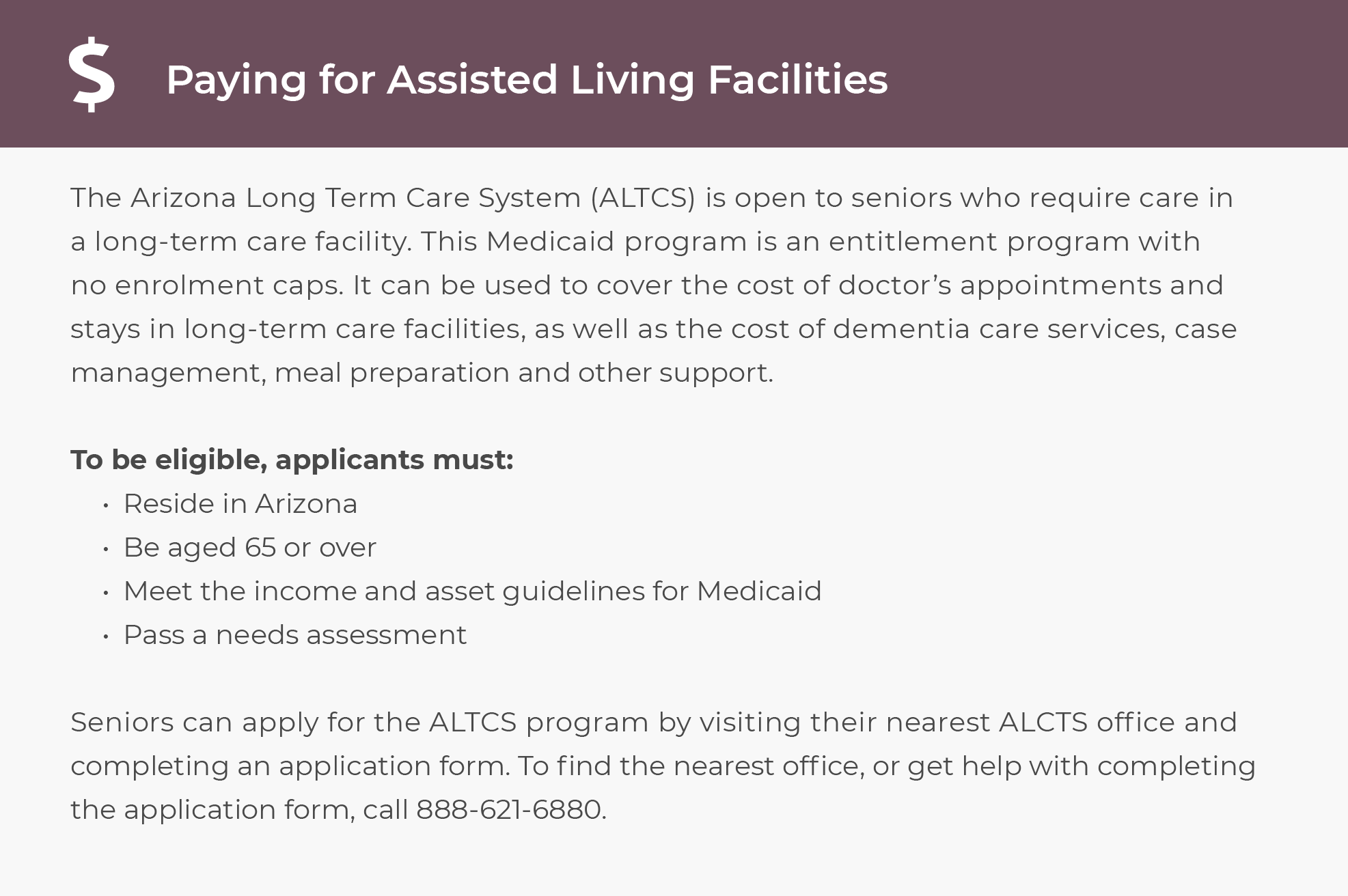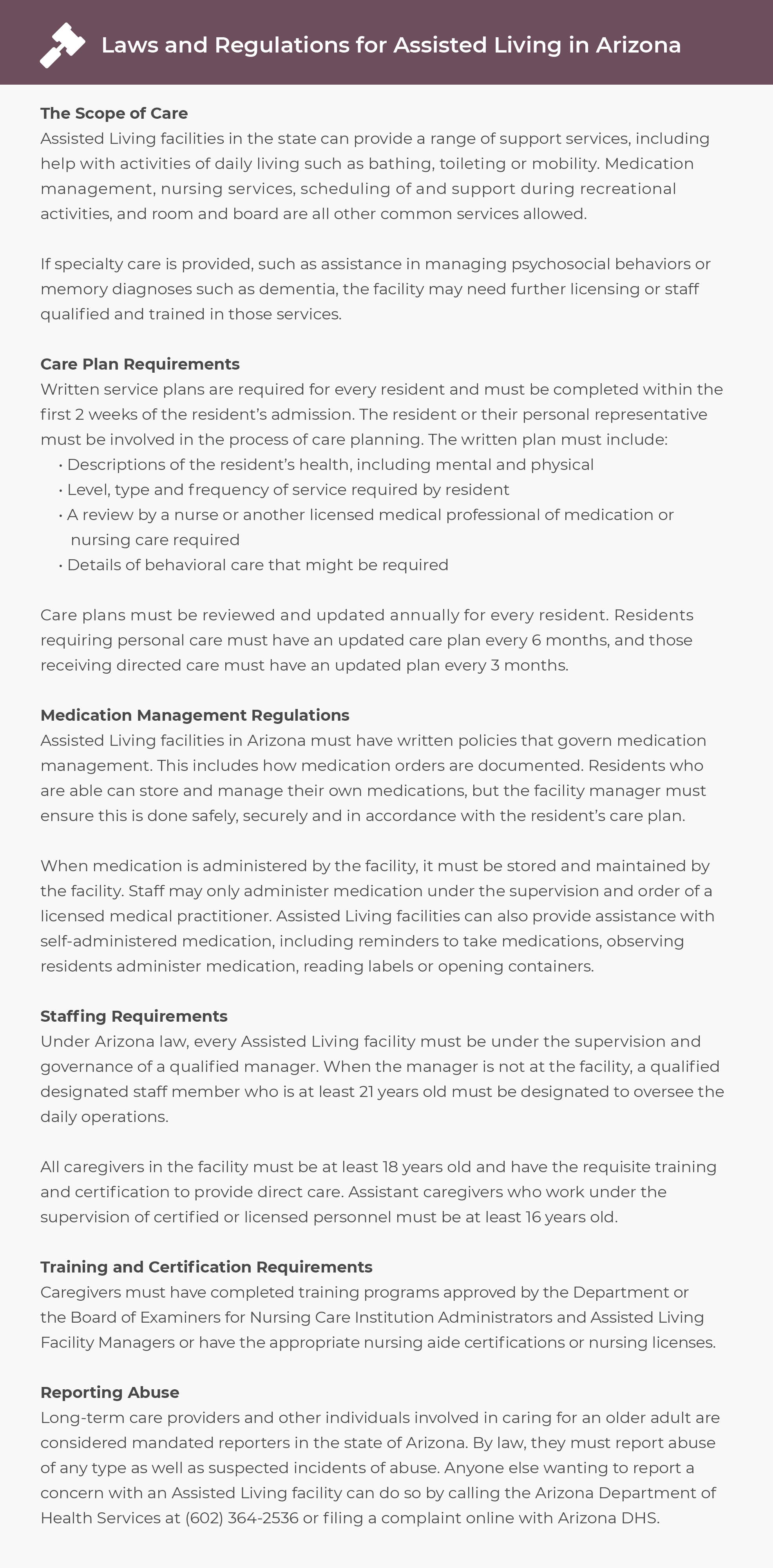Glendale, Arizona’s seventh-largest city, has a population of over 250,000 people, 11.3% of whom are aged 65 and older. Seniors who choose to live in Glendale benefit from its sunny, dry climate, with average daytime temperatures ranging from 73 degrees during the mild winters to 98 in the summer months. The city offers numerous amenities, including a historic downtown filled with unique shops and eateries, museums to pique a variety of interests, championship golf courses, desert-themed botanical gardens and home games of the NFL’s Arizona Cardinals and NHL’s Arizona Coyotes. Glendale’s location also provides residents with easy access to outdoor activities in the surrounding Sonoran Desert and nearby Tonto National Forest.
Seniors who need a little extra daily help may thrive in an assisted living community. These locations provide safe, social environments where seniors have access to assistance with daily tasks, chore services and recreational programming. In Glendale, these types of facilities cost an average of $3,975 per month, which is slightly lower than the Arizona state median and over $500 less than the U.S. national average.
In this guide, you’ll find information about assisted living in Glendale, including a cost comparison between nearby cities, available financial resources and a list of local organizations offering senior-focused services.
Hundreds of thousands of American seniors utilize assisted living, a figure that is only growing. For these seniors, assisted living combines residential housing,assistance in daily activities, and some healthcare. These communities also strive to provide an atmosphere that is comfortable and engaging for their residents… Read More >
COVID-19 restrictions and rules for Assisted Living Facilities are typically set by the state – to see the rules in your state, you can read our guide to Assisted Living in Arizona. Keep in mind that there may be other policies that communities put in place to protect their residents, so you should contact your local community for more information. Additionally, you can contact your local Area Agency on Aging to learn more – find contact information here.
Seniors living in the Glendale area can expect to pay an average of $3,975 per month for assisted living services, according to Genworth’s 2021 Cost of Care Survey.
Assisted living costs in Glendale are similar to the state median of $4,000. Like many other cities in Arizona, Glendale’s average assisted living rates are far below the U.S. average of $4,500, allowing seniors to save roughly $525 per month.
Yuma offers lower rates than Glendale, but only by about $175. Costs in Tucson are only $75 higher per month, and the Sierra Vista area is $175 more expensive than Glendale. Care costs are much higher in northern Arizona. Compared to Glendale, costs in Prescott Valley and Lake Havasu City are $525 and $725 higher, respectively. Flagstaff is the most expensive city in the state, with rates averaging $5,000 per month.
Note: Data for Glendale was unavailable, so data for the nearest city, Phoenix, was used instead.

Since not everyone can afford to pay for assisted living out-of-pocket, it’s important to find alternative methods to help make assisted living more affordable. Some of these options include:
For more information about your options for making assisted living more affordable, visit our guide to Assisted Living in Arizona.
| Contact | Description | |
| Glendale Adult Center | (623) 930-4321 | The Glendale Adult Center offers an array of programs and activities designed to enhance the quality of life for local residents. The center features a computer lab, fitness center and card/game room. In addition to various support services, the center offers exercise and craft classes, shared-interest clubs, themed events and regularly scheduled guest talks on health, wellness and support topics. Glendale residents can join for a nominal quarterly membership fee, which is waived for anyone who has the SilverSneakers program as a health plan benefit. |
| Arizona Department Of Veterans’ Services | (602) 255-3373 | Senior veterans in Glendale can contact the Arizona Department Of Veterans’ Services office in Phoenix to learn about available federal and state financial benefits that may help cover the cost of assisted living. The office’s trained staff can answer questions; clarify the eligibility requirements for pensions, disability benefits and top-up programs, such as VA Aid and Attendance: and assist veterans with filing applications and appeals. |
| Retired and Senior Volunteer Program – Caring Circles | (602) 264-2255 | The RSVP program works in conjunction with Area Agency on Aging, Region One to offer rewarding volunteer opportunities to Glendale residents aged 55 and older. Through the AAA’s Caring Circles Program, RSVP volunteers provide support to homebound seniors awaiting formalized care. |
| City of Glendale Transit Services | (623) 930-2940 | The City of Glendale’s Department of Transit Services offers several options to meet the unique transportation needs of senior residents. These include the reduced-fare Dial-A-Ride program, cost-free Glendale Urban Shuttle (GUS) bus service and taxi vouchers for those receiving physician-ordered medical and therapy treatments. |
| Long-Term Care Ombudsman Program | (602) 264-2255 | Arizona’s Long-Term Care Ombudsman Program provides advocacy and support for residents of Glendale assisted living facilities. Volunteer ombudsmen monitor conditions in local long-term care facilities, advise residents of their rights and help them resolve problems related to their care and living conditions. These services are always confidential and free of charge. |
| Arizona Senior Citizens Law Project | (602) 252-6710 | Low-income Glendale residents aged 60 and older can obtain free legal advice and assistance through the Arizona Senior Citizens Law Project. The project’s trained advocates and volunteer lawyers can help eligible seniors with various civil legal issues, including wills, probate, guardianship, government benefits and consumer protection concerns. |
Assisted Living Facilities in the Glendale area are required to follow a set of rules and regulations that are determined at the state level. For an overview of those rules and regulations, see the information below. For more specific information, talk with your local community or Area Agency on Aging.











